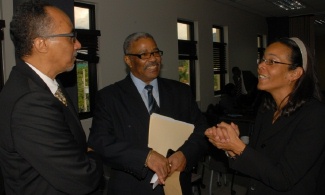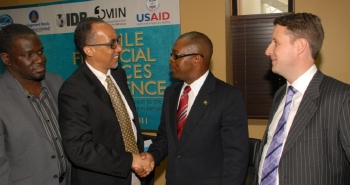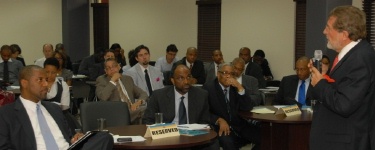Jamaicans Need Better Financial Access – Dawn Elliott
KINGSTON, Jamaica – More than three out of every four Jamaicans have limited access to safe and low-cost payments channels, says US Economist Dr. Dawn Elliott.
Jamaica has a hidden problem as the majority of the population own bank accounts; but only a fraction of this group has access to the financial services, which allows them to participate easily and effectively in the economy, Dr. Elliott said. She was addressing the Mobile Financial Services Conference 2011 at the University of the West Indies, Mona, on December 12.
“Most Jamaican make payments using cash,” the Associate Professor in the Department of Economics at Texas Christian University stated. A comprehensive research survey, which she headed, showed that only 12 percent of the population own the types of accounts which allows them to transfer money, write cheques or make credit card payments.
The survey, contracted by Solutions for Society, a Think Tank of the UWI, showed that 33.65 percent of the adult population do not own bank accounts; and, therefore use cash or the non-bank payment outlets at relatively high costs. In addition to this group, she said that almost 80 percent of those who own a bank account cannot make payments easily or conveniently to support efficient commerce, as they do not own transaction accounts.
Mobile Financial services covers mobile banking, mobile remittances or money transfers and mobile payments, said Dr. Maurice McNaughton, Director of the Centre of Excellence of the Mona School of Business (MSB), at The UWI and a member of Solutions for Society. He told the conference that the use of mobile phones to conduct such transactions “has enormous macroeconomic potential,” with implications for economic inclusion, as well as the efficiency of commerce.
“You have many folks outside of the system and those are the ones who have no payment access through account ownership,” Dr. Elliott stated. “They are not borrowing from the banks; they are not investing; they are not building assets; they are not building wealth, and their businesses stay in a survival mode.”
A country where a large part of the population cannot easily satisfy their need for financial services will benefit from the introduction of a Mobile Financial System, she declared. Financial institutions attract deposits from more than 2/3 of the adult population, but these institutions fail to redirect these deposits into borrowing and wealth generating activities, and they fail to support money-transfers on the island.
Livingstone Morrison, Deputy Governor at the Bank of Jamaica said the development of a regulatory framework for retail payment systems had to be guided by the fact that innovative retail payment mechanisms could play a significant role in expanding access to payment services for a wider segment of the population and in providing more choice for consumers.

Dr. Dawn Elliott (right) exchanges views with Wendell Smith (left), Assistant General Manager, Management Information Systems and Operations, Jamaica National Building Society and Professor Evan Duggan, Executive Director, Mona School of Business, University of the West Indies.
He said the domestic payment services sector is already well developed with non-bank financial entities, including credit unions, building societies, bill payment entities and money changers, being active players in the payments market.
Wendell Smith, Assistant General Manager, Management Information Systems and Operations, at Jamaica National Building Society (JNBS) said the introduction of the mobile phone as a payment point in the remittance business promises to be a major breakthrough.

Wendell Smith (second left), Chairman, MC Systems, greets Livingstone Morrison (third left), Deputy Governor, Bank of Jamaica, while Omar Howell (left), Mobile Financial Services Product Development Manager, LIME, and Aidan Heavey, Head of Business Development, Digicel Group, look on.
At JN Money Services (JNMS), a JNBS subsidiary, a smart card based remittance service was introduced in 2004 which decoupled recipients from fixed branches or agent locations. Mr. Smith said the card is used by one third of all JNMS customers as recipients can now access an additional 550 ATM’s, as well as some 8,000 Point of Sale Terminals at merchant locations, throughout the country.
With the near universal penetration of cellular phones, the use of cell phones as a payment point would provide a significant edge for its users, Mr. Smith said. He added that by removing fixed agent and branch locations from the remittance system, “the costs for both domestic and international remittances will be reduced.”
Dr. McNaughton pointed out that given the clear advantages of the introduction of such services, consultations could now begin on the actual implementation of a system targeted at reaching the unbanked population of the country.

Carl Rosenquist (right), Chartered IT Professional, outlines mobile payment options to (from left, front) Dr. Wayne Henry, Jamaica Bankers Association; Earl Jarrett, General Manager, Jamaica National Building Society; Professor Evan Duggan, Executive Director, Mona School of Business, UWI; Dr. David Lowe Advisor to the Minister of Industry, Investment and Commerce and other audience members. Mr. Rosenquist was addressing the Mobile Financial Services Conference 2011 at the University of the West Indies, Mona.





